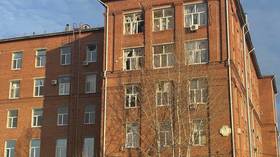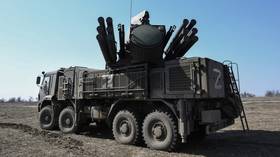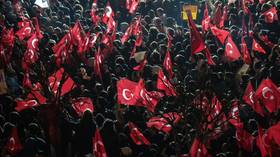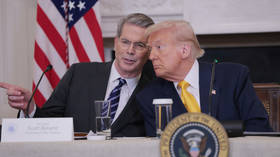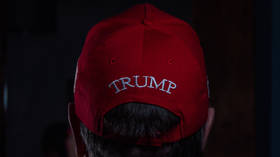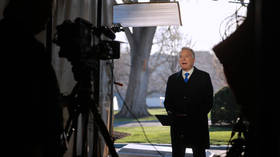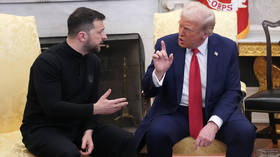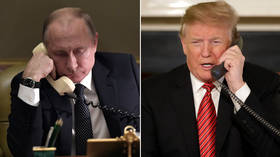Why journalists are vulnerable in Iraq
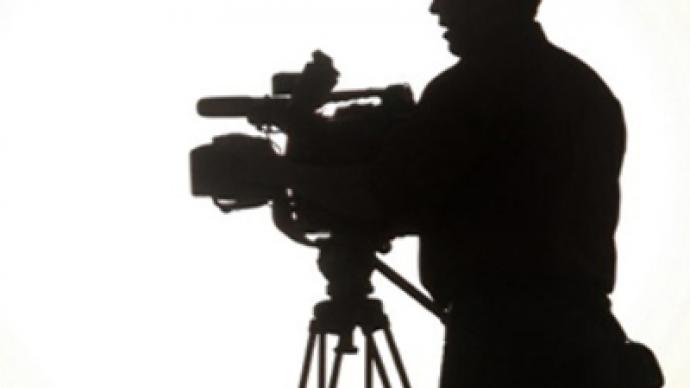
“Martyr journalists” is the Arabic name for the woeful list of 247 reporters killed in Iraq over the seven-year occupation period. The names of their assistants, both Iraqi and foreign, are also on the list.
The word “martyr” in Russian has the same meaning as in Arabic – a person who has made the ultimate sacrifice in the name of god. In this world, god and the press are pretty much at the opposite ends of the spectrum. One has to come to Iraq to understand why journalists are close to god here.
The list of deceased journalists is growing fast. Not as fast as the list of civilians killed, of course. Unlike civilians, who are simply killed in the bombings, journalists have to play the role of witnesses. This is what they are killed for.
137 journalists are listed as killed while doing their jobs. Listed alongside of them are the names of 52 “technical” assistants: cameramen, interpreters and drivers. This is the story told to me by Ziad al-Ajili, head of the Journalist Freedom Observatory and a tired man.
Mr. Ajili says he has not seen anyone protecting journalists in Iraq, or even working on providing any kind of satisfactory conditions for them to work in.
“The Prime Minister’s advisors are stupid,” he said. They have tried to convince him that the country’s main problem is not the government, but the press. This is why the press is banned from everywhere. The government keeps saying it wants to support law and order, but they have no idea what law is.
The threat to Ziad al Ajili’s life is constant: he is the one counting the dead and demanding investigations into the killings.
According to Mr. Ajili’s sources, 169 journalists have been killed by the Iraqi insurgents, 22 by the U.S. army, 2 by the army of Iraq and 1 by the Spanish legion.
This information pleases the US and the foreign media. They think the figures indicate how low the insurgents have fallen – killing journalists. But this is only true unless you take a closer look at what is happening in Iraq. If you do look closely, the picture is quite different.
Most journalists who were working alongside the US Army during the first years of the invasion have been killed along with the invaders. The longer the US army stays in Iraq, the fewer journalists come to cover the events here, since the work is extremely difficult and dangerous.
A lot of Western media have held back their journalists from going to Iraq. US journalists cover the events from within the military bases’ perimeters. Iraqi journalists, on the other hand, know that if they want to tell the truth about the war, their lives will be of no value to anyone.
The Iraqi campaign is a forgotten war for most, a war that people usually remember about when a blast kills 50 people. Yet none questions why this is happening.
When attacking in 2003, Americans dropped a bomb and fired on the Palestine Hotel, where the majority of reporters lived. They shelled Al Jazeera’s office and shot at a car belonging to the Abu Dhabi channel. Nearly ten journalists were killed after their attacks. Baghdad is not currently bombed. However, recently, shortly after elections, 28 year old journalist Aseel al-Obeidi and her husband were killed by American troops on March 11 in Baghdad.
They drove through the area where Americans conducted an operation, though according to official information they had allegedly left the city. The Americans had pumped so many bullets into Aseel that surgeons and the Iraqi policemen said the dead bodies “were pierced with holes.”
Aseel’s car reportedly began to move in a way Americans didn’t like. They prefer that a car should press itself against a border and stop immediately. The JFO doesn’t expect the case to be investigated and Americans to be punished. If this happens, then it’ll be the first exception of 247 uninvestigated cases into killings of reporters.
It’s forbidden to film American patrols, and you are not allowed to move in front of them. You cannot look at their sides, either.
The thing is that Iraqis, young and old, for seven years have gotten acquainted to a new factor in their life – occupation. They know how they should behave with those soldiers who wear armor, walk only within military bases perimeters, don’t take to streets on their own or only in one car. They are aware that these soldiers shoot first, and then think. (It’s only a fable when “The Hurt Locker” movie tells that combat engineers take trips in single cars and troops socialize with locals.)
When I was about to cross the road a security guy and an interpreter immediately explained to me how to deal with Americans, having blocked up the road and forcing me to bow my head.
“Nadya, look down,” the interpreter whispered to me.
Five armored vehicles of sand color were moving along the road, reminding me of Hollywood monsters. When I asked them what could happen had they not stopped me, I got a dull answer:
“You would be shot down and leveled to the asphalt.”
A director of the American media center, whose name I cannot repeat, told me how his employees lived:
“We never say at home where we work, as we don’t want neigbors to accidentally learn that we work for Americans. We don’t tell anything about our job.”
They don’t have visiting cards, there are names on their offices, they don’t give their telephone numbers and email addresses. They keep pictures with different politicians at work. They are guarded 24 hours a day.
They now go together to and from work in one jeep, which doesn’t carry the word “Press”. The majority of those “who work on the ground” are women. It’s not as dangerous for them as for men. If they interview somebody in the street they don’t name their company. If they take interviews in offices they don’t inform security about their place of work.
“Why?”
“You never know who is on guard, and to whom they can give a call.”
Journalists are not only killed, they are also kidnapped. Journalists who work for Americans are equated with collaborators, and they kill them as a foe’s accomplices.
According to the Committee to Protect Journalists (CPJ), over 10 years of the war in Afghanistan nine journalists were shot and killed and six journalists were shot and killed over 20 years of the civil war in Somali. In Russia from 1999 to 2006, 16 journalists were shot and killed, according to CPJ. According to their data, 88 journalists were killed in Iraq in the five years after 2003.
It doesn’t matter how you count, anyway, Iraq tops the list. However, it will take you long to look for any information related to Iraq on the websites of international organizations. Journalists don’t conduct any campaigns of solidarity with their Iraqi colleagues.
However, sort a of information and propaganda tsunami goes through the West and its allied countries to support 52 allegedly arrested activists in Iran, the majority of whom have already been released.
What’s going on? What’s the reason for this unbalanced attention?
I worked in Iran, including during its latest election, and I can compare what happens to journalists here and there.
In Iran, I have never been told “No camera!”, except for a few holy places.
In the meantime, in Iraq, I was reminded about that countless number of times. I was forbidden to film everything for very different reasons.
In this enclave of a new American democracy, there is no need for formal accreditation – you just need permission literally for each step, almost for each breath.
Passengers with whom I came to Iraq on board the Damask-Baghdad bus were the first who forbade me to film. They told me about that as soon as we had passed the neutral zone and a frontier post .
They were even afraid that if soldiers noticed me, all of them would immediately have big problems at the checkpoints. They asked me not be seen on a front seat and go deep into the bus instead. And the closer we approached Baghdad, the more checkpoints there were on the road.
When finally in the twilight we arrived in Baghdad, all the bus burst into laughing to shake off the tense 14-hour drive. Ahead of us a cow was sedately riding to the city in a truck body. Now I can confidently say that it was the only object for filming which didn’t cause any protests. However, the cow, perhaps, just didn’t notice that I had been filming her and therefore she didn’t protest by mooing.
The security man and the interpreter seriously warned me against filming as soon as a checkpoint or a convoy of dragon-like American vehicles appeared in the distance. They also asked me not to film in traffic jams – what if somebody would notice. They forbade me from leaving the car in a traffic jam, and walking 20 meters among other cars to reach a control point within the perimeters of a guarded hotel – what if somebody had already been reporting on me to someone who needed it or to those who wanted to kidnap me.
You cannot leave the hotel territory on your own, you cannot take a taxi on the street. In the hotel, they would never let you take a taxi on call; your security guard should be armed. You should go only to those meetings that you’ve scheduled beforehand, and you should be met and accompanied to their places. This is the way you can work in Iraq.
This instruction was repeatedly worded to me by many different people who helped me in Iraq. They knew that the notions of “a journalist” and “a martyr” are too close, that they almost intersect.
Security men who guarded fences demanded that I stop filming concrete blocks.
Any guard in charge of a rising arm barrier requested a permit from some higher authority. It’s banned to film everything without permission. If you have a permit to film a building from the outside, it won’t ensure your filming inside.
I needed a separate permit to film a poster inside the building.
I wasn’t allowed to take a picture of a famous entrance to the Iraq Museum; they didn’t let me enter the most famous Armenian church in Baghdad even after I had presented all my journalist papers and letters of recommendation.
They didn’t want to let me go onto the territory of Baghdad University. You had to whisper in its park and not take a camera out. It was forbidden to enter its buildings, as the meetings were postponed. You should also have a permit to take pictures of students. People, young and old, turned away from my camera lens. Children who could hardly walk wagged their fingers at me.
Italian journalist Juliana Segrena, whom rebels kidnapped in 2005 and later Americans tried to shoot, believes that Iraqis had been very friendly toward journalists before 2003. She visited Iraq shortly before the invasion.
But when the country turned into debris, and its citizens were claimed to be potential terrorists, Iraqis stopped trusting journalists any longer.
Therefore, it’s so hard for journalists to work in occupied Iraq – each one is against them. Therefore, this work looks so much like the martyrdom.
Nadezhda Kevorkova for RT
REFERENCE
Nadezhda Kevorkova worked as a special reporter in Iraq shortly before the elections in February 2010. Kevorkova has also worked in Iran, Afghanistan, Syria, Pakistan, Lebanon, Egypt, Turkey, the U.S. as well as in Dagestan, Chechnya, Kabardino-Balkaria, Ingushetia and Tatarstan.



